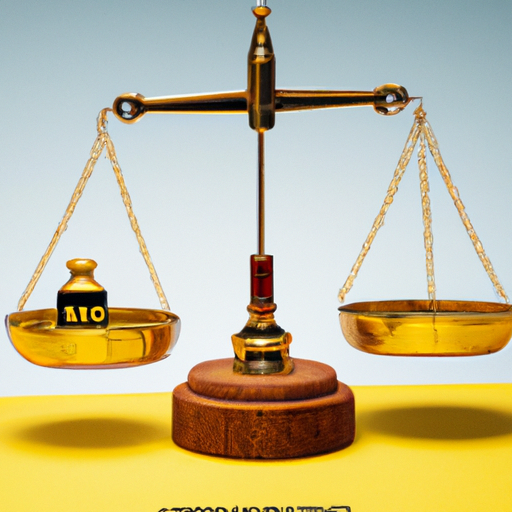In the fast-paced world of influencer marketing, it is essential for businesses and their leaders to navigate the ever-changing landscape of social media claims compliance. In an age where online influencers hold significant sway over consumer behavior, it is crucial for businesses to stay abreast of the legal requirements and guidelines surrounding influencer marketing. This article aims to provide a comprehensive overview of the subject, exploring key considerations, best practices, and the potential legal pitfalls involved. By understanding the importance of social media claims compliance, businesses can safeguard their brand reputation and ensure a successful influencer marketing strategy.

The Importance of Social Media Claims Compliance for Influencer Marketing
In today’s digital age, influencer marketing has become a powerful tool for businesses to reach their target audience. With the rise of social media platforms, influencers have gained significant influence and can persuade their followers’ purchasing decisions. While this type of marketing can be highly effective, it also poses legal and ethical considerations, particularly when it comes to social media claims compliance.
Why Social Media Claims Compliance is Crucial
Social media claims compliance refers to the adherence to laws, regulations, and ethical guidelines in making claims or endorsements on social media platforms. It is crucial because it ensures transparency, reliability, and credibility in influencer marketing. By complying with these standards, businesses can protect their reputation, avoid legal troubles, and foster trust with their target audience.
Understanding Influencer Marketing
Influencer marketing is a form of marketing that leverages the popularity and reach of influential individuals on social media. These influencers have built a strong following and are viewed as experts or trendsetters in their respective fields. Businesses collaborate with influencers to promote their products or services, often through sponsored posts or endorsements.
Influencer marketing offers a unique advantage over traditional advertising as it allows businesses to tap into a specific audience and build a genuine connection with them. However, with this power comes the responsibility to ensure compliance with laws and regulations.
Laws and Regulations on Social Media Claims
Several laws and regulations govern social media claims and endorsements. The Federal Trade Commission (FTC), for example, has established guidelines and rules to protect consumers from misleading or deceptive advertising practices. Under these guidelines, influencers must disclose their relationship with the business when promoting a product or service.
Other laws, such as consumer protection laws and advertising regulations, may also apply depending on the jurisdiction and industry. It is essential for businesses to familiarize themselves with these regulations to avoid legal pitfalls and regulatory penalties.
Consequences of Non-Compliance
Non-compliance with social media claims regulations can have severe consequences for businesses. The FTC is vigilant in monitoring and enforcing compliance, and non-compliant businesses can face investigations, enforcement actions, and financial penalties. Apart from legal implications, non-compliance can also damage a company’s reputation and erode trust among consumers. Companies that fail to prioritize social media claims compliance may face customer backlash and reduced sales.
To mitigate these risks, businesses must adopt best practices for social media claims compliance.
Best Practices for Social Media Claims Compliance
Developing a Clear Social Media Claims Policy
To ensure compliance and consistency in influencer marketing, businesses should develop a clear and comprehensive social media claims policy. This policy should outline the guidelines and requirements for influencers when promoting the business’s products or services. It should clearly articulate the need for truthful and accurate claims, proper disclosure practices, and adherence to relevant regulations.
Educating Influencers on Compliance
It is crucial to educate influencers on social media claims compliance. Many influencers may not be aware of the specific laws and regulations governing their activities. Providing them with comprehensive training on legal and ethical guidelines can help them understand the importance of compliance and the potential consequences of non-compliance. Businesses should also establish open lines of communication to address any questions or concerns the influencers may have.
Monitoring and Reviewing Influencer Posts
To maintain compliance, businesses must actively monitor and review the content posted by influencers. Regularly monitoring posts can identify any potential issues or violations, allowing businesses to take prompt action to correct or remove non-compliant content. Implementing advanced social media monitoring tools can streamline this process and provide businesses with valuable insights into their influencer marketing campaigns.
Maintaining Records of Influencer Relationships
Keeping detailed records of influencer relationships and collaborations is essential for compliance and accountability. These records should include contracts, communication history, and evidence of disclosures. Maintaining these records helps businesses demonstrate their commitment to compliance and provides documentation in the event of an investigation or legal dispute.
Implementing FTC Disclosures
The FTC requires influencers to disclose their relationship with a business when promoting its products or services. The disclosure must be clear, unambiguous, and easily understood by the average consumer. Businesses should provide influencers with clear guidelines for disclosure practices and monitor their compliance closely. Effective disclosure practices can safeguard a business’s reputation and maintain transparency with consumers.
Disclosure Guidelines for Influencer Marketing
FTC Disclosure Rules and Regulations
The FTC has established clear rules and regulations regarding disclosures in influencer marketing. According to these guidelines, influencers must clearly and conspicuously disclose their relationship with a business when endorsing its products or services. The disclosure should be placed in a manner that consumers can easily notice and understand, ensuring transparency and preventing any potential confusion or deception.
Effective Disclosure Practices for Influencers
Influencers should embrace disclosure practices that align with the FTC guidelines. Disclosures should be upfront, honest, and placed in a location that ensures maximum visibility to consumers. It is recommended to include the disclosure at the beginning of a post or in the caption, rather than burying it in a sea of hashtags. Using clear and simple language can help consumers easily understand the nature of the influencer’s endorsement.
Types of Disclosures and their Placement
Influencers have various options for disclosing their relationship with a business. Some commonly used disclosures include “Ad,” “Sponsored,” “Paid partnership,” or “Promotion.” These disclosures can be placed prominently at the beginning of a post, ensuring consumers are aware of the commercial nature of the content. Additionally, hashtags like #ad or #sponsored can be used in the caption or by tagging the brand.
While the specific disclosure requirements may vary depending on the platform, the key is to provide clear and transparent information to consumers.
Ensuring Accuracy and Substantiation of Claims
Importance of Accuracy in Social Media Advertising
Accuracy is of utmost importance in social media advertising. Businesses must ensure that the claims made by influencers regarding their products or services are accurate, truthful, and supported by evidence. Misleading or exaggerated claims can lead to legal consequences, damage the business’s reputation, and erode consumer trust.
Standards for Substantiating Claims
Claims made by influencers should be substantiated with reliable evidence. This evidence might include scientific studies, market research, or other verifiable data. Businesses should provide influencers with accurate information about their products or services and ensure they have access to relevant supporting materials. It is essential to establish a system for reviewing and approving claims made by influencers before they are published.
Ensuring Endorsements are Truthful and Supported
Endorsements made by influencers should always reflect their genuine opinions and experiences. They should not make false or misleading statements that may deceive consumers. Businesses must provide accurate information to influencers, allowing them to form informed opinions about the products or services they are endorsing. Encouraging truthful endorsements can build trust with consumers and strengthen the influencer-business relationship.

Avoiding Deceptive Marketing Practices
Identifying and Avoiding Misleading Content
Businesses must be vigilant in identifying and avoiding misleading content in influencer marketing. This means carefully reviewing influencer posts for any claims, images, or statements that could potentially mislead consumers. Common examples of misleading content include false claims of product effectiveness, undisclosed material connections with the business, or using unrepresentative before-and-after images. By being proactive in identifying and addressing misleading content, businesses can maintain ethical marketing practices.
Recognizing Red Flags of Deceptive Advertising
To effectively avoid deceptive advertising, businesses should educate themselves on the red flags to look out for. Red flags may include unrealistic claims, endorsements that are too positive or lack authenticity, or inconsistent disclosures. By recognizing these signals, businesses can take appropriate action to rectify the situation and maintain integrity in their influencer marketing campaigns.
Ethical Considerations for Influencer Marketing
Ethics should guide every aspect of influencer marketing. Businesses should prioritize honest and transparent practices that put the interests of their target audience first. This includes avoiding deceptive marketing tactics, ensuring fairness and accuracy in claims, and maintaining open and honest communication with influencers. By upholding ethical considerations, businesses can build a positive brand image and cultivate long-term customer loyalty.
Working with Influencers: Legal Considerations
Drafting a Well-Defined Influencer Agreement
A well-defined influencer agreement is crucial for establishing the rights, responsibilities, and expectations of both the business and the influencer. The agreement should outline the scope of work, compensation terms, product disclosure requirements, and compliance with laws and regulations. By clearly defining these terms, businesses can mitigate potential conflicts and ensure alignment with social media claims compliance.
Intellectual Property Rights and Licenses
Intellectual property rights play a significant role in influencer marketing. Businesses should clarify ownership and usage rights of content created by influencers. The agreement should clearly state whether the business has the right to use influencers’ content and to what extent. Protecting intellectual property rights can prevent legal disputes and maintain control over the business’s brand image.
Addressing Potential Liability Issues
Influencer marketing carries inherent risks, and businesses must address potential liability issues in their agreements. This includes disclaimers on the accuracy of claims made by influencers, limitations on liability, and provisions that indemnify the business against any legal claims arising from the influencer’s actions. By proactively addressing liability concerns, businesses can protect themselves from the financial and reputational consequences of non-compliance.
Implications for Businesses and Business Owners
Risk and Liability for Companies
Non-compliance with social media claims regulations can expose businesses to significant risk and liability. Companies may face regulatory investigations, enforcement actions, fines, or even legal disputes with consumers. In addition to these financial consequences, brand reputation and customer trust can suffer, resulting in decreased sales and market share. Businesses must recognize the potential risks and take proactive measures to ensure compliance.
The Role of Businesses in Ensuring Compliance
Businesses have a crucial role in ensuring compliance in influencer marketing. By setting clear guidelines, providing education and training, and actively monitoring influencer posts, companies can create a culture of compliance. Compliance should be a top priority, supported by executive leadership and integrated into the overall marketing strategy.
Benefits of Transparent Influencer Marketing
Transparent influencer marketing offers numerous benefits for businesses. By adhering to social media claims compliance, companies can build credibility and trust with their target audience. Transparent marketing practices provide customers with accurate information, fostering brand loyalty and long-term relationships. Furthermore, compliance enhances the overall reputation of businesses, positioning them as responsible and trustworthy industry players.
Enforcement and Penalties for Non-Compliance
FTC Investigations and Enforcement Actions
The FTC is responsible for enforcing compliance with social media claims regulations. The agency actively monitors influencer marketing campaigns and investigates potential non-compliance. In cases where violations are identified, the FTC can take enforcement actions, including warnings, consent orders, fines, or legal proceedings. The agency’s enforcement efforts aim to protect consumers’ rights and maintain fairness in the marketplace.
Potential Legal Ramifications
Non-compliance with social media claims regulations can lead to legal ramifications for businesses. Consumers who feel deceived or misled by influencer marketing campaigns may initiate legal actions, seeking damages or refunds. Businesses may also face lawsuits from competitors or class-action lawsuits representing multiple consumers. Legal professionals specializing in advertising and intellectual property law can help businesses navigate these potential legal complexities.
Financial and Reputational Consequences
The financial and reputational consequences of non-compliance can be severe. Regulatory fines can range from thousands to millions of dollars, depending on the severity of the violation. These fines, coupled with potential legal costs and damages awarded in lawsuits, can severely impact a business’s bottom line. Beyond the financial consequences, non-compliance can tarnish a company’s reputation, leading to customer distrust, negative publicity, and decreased market value.

Maintaining Compliance in a Changing Landscape
Staying Up-to-Date with Regulatory Changes
The landscape of social media claims compliance is constantly evolving. Businesses must stay up-to-date with changes in laws, regulations, and guidelines to maintain compliance. Regularly monitoring regulatory updates, subscribing to industry newsletters, and consulting legal professionals can help businesses ensure that their practices align with the latest standards.
Evolving Best Practices for Compliance
Best practices for social media claims compliance are continuously evolving as the influencer marketing landscape adapts to new challenges. Businesses should actively seek out and incorporate emerging best practices into their policies and procedures. Engaging with industry experts, attending conferences or webinars, and participating in relevant professional communities can help businesses stay ahead and continually improve their compliance efforts.
Training and Continued Education for Influencers
Education and training are vital for influencer compliance. Businesses should provide influencers with comprehensive training on legal and ethical guidelines, including the importance of accuracy, transparency, and disclosure. Regular refresher courses and educational materials can keep influencers informed about changing regulations and emerging compliance best practices. By investing in the education of influencers, businesses can cultivate a network of compliant and responsible partners.
FAQs: Social Media Claims Compliance for Influencer Marketing
Q1: What are the legal guidelines for influencers on social media?
Legal guidelines for influencers on social media include the requirement to disclose their relationship with a business when endorsing its products or services. They must ensure their claims are accurate, substantiated, and supported by evidence. Influencers should avoid deceptive marketing practices and follow the FTC’s guidelines on transparent disclosure practices.
Q2: What should businesses do to ensure compliance?
Businesses should develop a clear social media claims policy, educate influencers on compliance, monitor and review influencer posts, maintain records of influencer relationships, and implement FTC disclosure guidelines. By prioritizing compliance and implementing these best practices, businesses can reduce the risk of non-compliance and protect their reputation.
Q3: How can influencers effectively disclose their partnerships?
Influencers can effectively disclose their partnerships by using clear and unambiguous language. They should place the disclosure in a location that ensures maximum visibility, such as at the beginning of a post or in the caption. Hashtags like #ad or #sponsored can also be used to disclose the commercial nature of the content.
Q4: Can businesses be held liable for influencer’s non-compliance?
Yes, businesses can be held liable for influencer non-compliance if they fail to exercise due diligence in ensuring compliance. Businesses should enact comprehensive influencer agreements that address compliance requirements, intellectual property rights, and liability issues. By taking proactive measures, businesses can mitigate the risk of liability.
Q5: How often should businesses review influencer posts?
Businesses should review influencer posts regularly to ensure compliance. The frequency of reviews may depend on various factors, such as the volume of influencer content or the level of risk associated with the industry. Implementing social media monitoring tools can streamline this process and provide businesses with real-time insights into influencer activities.
